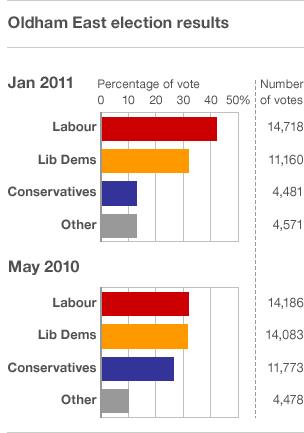Ed Miliband: Oldham East win 'first step' for Labour
- Published
Ed Miliband said the win was the ''first step'' for Labour to win back trust
Ed Miliband has said Labour's by-election victory is the "first step in a long journey" for his party.
The Labour leader said the party's win in Oldham East and Saddleworth, with a majority of 3,558 also sent a "clear message" to the government.
Lib Dem Elwyn Watkins came second but fractionally increased the party's vote share on the 2010 result.
But the Tories saw their vote share halved - they denied "soft pedalling" to help their coalition partners.
The Greater Manchester by-election was called after a special court found ex-Labour minister Phil Woolas made false statements about Mr Watkins in May's general election, in which Labour retained the seat by just 103 votes over the Lib Dems.
The ruling invalidated the result and resulted in Mr Woolas being barred from politics for three years.

But in Thursday's by-election Labour secured a much clearer victory - finishing 3,558 votes ahead of the Lib Dems with 14,718 votes. The party's share of the vote increased from 31.9% to 42%.
Although the Lib Dems failed to snatch the seat, their share of the vote actually increased slightly, from 31.6% at the general election to 31.9%.
They polled 11,160 votes, with the Conservatives getting 4,481 (12.8% share), UKIP 2,029 (5.8%) and the BNP 1,560 (4.5%).
However, the Tories' share of the vote fell from 26.4% in May.
The by-election was the first significant opportunity that voters have had to pass judgement on the policies of the coalition government and Ed Miliband's performance as opposition leader.
Mr Miliband said it showed Prime Minister David Cameron and Deputy Prime Minister Nick Clegg should "think again" on their policies and listen to voters.
'Coming back to Labour'
He said: "I think the voters of Oldham east and Saddleworth have sent a very clear message to the government about some of the things they've been doing, the rise in VAT, the trebling of tuition fees and the police cuts."
He added: "This is the first step in a long journey for Labour. But more importantly, I hope the government will listen to what they've said about those key issues."
Nick Clegg: "It's a challenging time for the Liberal Democrats."
At a question and answer event in Hove, East Sussex, Mr Miliband added that the Lib Dems should not "take false comfort from this result" but also told journalists he was not saying it gave Labour any "guarantees about the future".
"I think it shows that people are coming back to Labour but we have a long hard road ahead to win back people's trust."
But the Conservatives and Lib Dems argued that Labour had held the seat since it was created in 1997.
Lib Dem deputy leader Simon Hughes told the BBC his party was in "good heart".
"We pushed up our share of the vote and actually we had the same share of the vote yesterday as Labour won with at the general election just a few months ago."
Party leader Nick Clegg, who visited the constituency three times to throw his weight behind the party's candidate Elwyn Watkins, said the party had "brought the fight to Labour's front door in a way that will have confounded our critics".
"I think it was a strong result given the circumstances in which the by-election was fought. It was a by-election held in unusual circumstances at a time when the government is taking difficult decisions, of which we are a part," Mr Clegg said.
Turnout in the contest was considerably lower than in the general election, with 48% of registered voters casting their ballots compared with 61% in May.
The Conservatives said it was inevitable that, in by-elections, the party that started in third place would see its vote squeezed.
David Cameron said he was proud of the campaign but said it was "often the way" that the party that started in third place, ended in third place in by-elections.
"Governments rarely take by elections off opposition parties - I think the last time it happened was 30 years ago during the Falklands War, so this was not an unexpected result," he said.
But he said he would continue to go around the country explaining why "difficult decisions" were being taken "in the long term interests of everyone in our country".
Conservative Party co-chairman Baroness Warsi denied the Conservatives had deliberately fought a lacklustre campaign to benefit their coalition partners. She told the BBC: "It was resourced properly. We had volunteers on the ground. We had professionals on the ground. We had a great local candidate."
She said the Tories had run a "positive campaign" and while they had not attacked the Lib Dems, they had "never campaigned for them either".
But her message to critics in "the right wing of our party" that those who had not taken part in the campaign "really don't have a right to complain" annoyed some.
ConservativeHome blogger Tim Montgomerie told the BBC: "She should be defending her own campaign rather than lashing out at others."
Ten candidates, in total, stood in the contest. UKIP came fourth with 2,029 votes, ahead of the BNP and the Green Party.
- Published14 January 2011
- Published14 January 2011
- Published14 January 2011
- Published14 January 2011